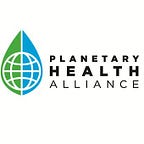Speaker Spotlight: Ann Kurth
By: Aubrey Doede, Speaker Ambassador at the 2018 Planetary Health Annual Meeting
During this year’s Planetary Health Annual Meeting, I had the opportunity to meet and speak with Dr. Ann Kurth, dean of the School of Nursing at Yale University and a prominent researcher in the field of global health. As a nurse in this emerging field, it has been difficult to find individuals in the field of nursing who are also interested engaging in research using the planetary health framework. Dr. Kurth and I discussed her impression of the impact of nurses and other healthcare providers and healthcare systems on the environment in terms of resource utilization as well as opportunities for making better health more achievable for patients using environmental information.
Environmental change tends to affect the most vulnerable populations most heavily, including — but certainly not limited to — those in the developing world, as vulnerable communities are present in the United States and other developed countries, including the population of interest in the present study. The anthropogenic disruption of earth’s natural systems will place the most burden on these communities, and in addition to scientific study, these populations will require advocacy at many levels, including at the levels of policy and natural resource management. This need calls upon the role that nurses have historically played in advocating for the health and rights of disadvantaged, vulnerable, and under-represented populations.
In addition to advocacy, nursing practice is equipped with a global, holistic view of human health that will be much needed in this field. Samuel Myers has called on “the boundaries of public health and nearly every other facet of human activity to become more porous.” Though Dr. Myers is a physician by training, the field of Planetary Health will also call on fields such as nursing to search for root causes and systemic problems within communities, health systems, and individual patients.
Finally, as trusted members of local communities, the nursing profession is already positioned to act as catalysts for the intersection of many approaches to potential solutions. This includes medicine and public health as well as environmental sciences and environmental health. However, in order to have an impact on humans at both the community and individual levels, this inter-disciplinary skill must be taken further than the academic arena. In order to take advocacy out of the universities and research communities and into the hands of community leaders and members, a broader integration must occur.
The emerging field of Planetary Health will require applications of research that take place cooperation with the populations and community stakeholders affected by environmental challenges. Nurses are uniquely positioned to investigate and contribute to solutions for research problems such as this. Public and global health nursing are situated at the intersection of evidence-based science and human health with a direct connection to the individuals within a given community.
Selected References:
Myers SS (2017). Planetary health: Protecting human health on a rapidly changing planet. The Lancet 390. doi: 10.1016/S0140–6736(17)32846–5
Kurth AE (2017). Planetary health and the role of nursing: A call to action. Journal of Nursing Scholarship 49(6):598–605. doi: 10.1111/jnu.12343
Disclaimer: The views and opinions expressed in this article are those of the author and do not necessarily reflect the position of the Planetary Health Alliance or its members.
